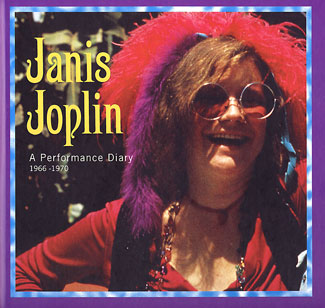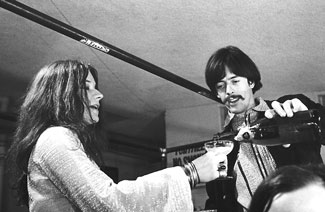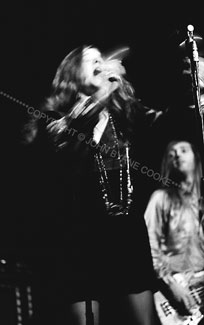Text Selections
"The Blues"
by John Byrne Cooke
"Been down so long, it looks like up to me..."
The blues is a moan and it's a shout of joy. The blues is a sharecropper playing a shoebox guitar sitting on the front porch in his work clothes, singing the blues because those are his Sunday-go-to-meeting clothes too, and it's B.B. King playing the same lick you've heard a hundred times but you still feel the blues in the same three notes. You sing the blues to keep from crying--or dying--and to celebrate your survival in the face of life's bad news. It's not an intellectual tradition. You feel the blues, or you don't.
Huddie Ledbetter--Leadbelly--was the first to get to Janis through the blues. A Texas convict sent to the chain gang for manslaughter, he touched the soul of a Texas girl growing up on the comfortable, middle-class-professional side of Port Arthur, a Gulf port oil town. She put a record on the turntable and there he was, grabbing hold of her with the blues. She had bad skin and she felt like she didn't fit in. The blues gave her a home. Bessie Smith touched her too, and Ma Rainey: women who had learned to sing in the dives and the juke joints along alleys where the whores worked out of six-bit cribs. They set loose the music in Janis's heart and pushed her toward the bright lights.
Growing up, Janis lived in a clean house and wore clean clothes. Her father was an engineer for an oil company. Her mother was a teacher. They were educated, decent people. They passed on to Janis a fierce intelligence and they encouraged her to nourish it, but no amount of education could cure her of the blues.
She sang the joy as well as the sadness. She sang it loud and long. Her joy reached out and touched a generation that was hungry for something besides the platitudes of the 1950s. A generation whose parents lied to them about drugs and sex and success and security and the American way, and who wanted to hear the truth. Janis sang the truth and they made her a star.
"Becoming Pearl"
by John Byrne Cooke
In the spring of 1970, Janis set out to put together a new band. No horn section this time. No musicians chosen by others who were unsure what she needed or what she wanted. This time the mistakes--or the triumph--would be hers. Brad Campbell and John Till, survivors of the Kozmic Blues, were living in San Francisco on retainer, biding their time. Albert Grossman brought Richard Bell on piano and Ken Pearson on organ down from Canada for Janis's approval. She approved. Brad and John were playing at a topless joint in San Francisco. The drummer was Clark Pierson, an American version of Ringo Starr with the same happy-go-lucky basic rhythm.
Want to go on the road, Clark? Sure.
The new band was complete. But first it needed a name. Enter Bob Neuwirth, former road manager for Bob Dylan, friend and confidant to Albert Grossman, painter, picker, singer, and sometime songwriter. Dropping by a rehearsal, recruiting companions for an evening's carousal, he demanded "Is everybody ready for a full tilt boogie?" "Full Tilt Boogie!" Janis shouted, and the Full Tilt Boogie Band was born.
Janis confided to the boys in the band that she wanted a nickname, something that suggested a good-time woman, like "Rose," or "Pearl." After a little discussion it came down to these two. Janis decided that "Rose" didn't sound right, and "Pearl" she became, the name already taking on an identity separate from the public persona of Janis Joplin. It was a way for her to appear among her friends as a peer--not a star. It was a private name, an intimate name, used for saying friendly things. We'd say "Knock 'em dead, Pearl" before a show, or "You're lookin' good, Pearl," or "Hey, sit down and tell me what's wrong, Pearl," or "Good night, Pearl," but when the talk was about business, or when communications got strained, as they do on the road, it was always Janis then, never Pearl. Pearl was reserved for the close times. It was a name that told her we loved her.


